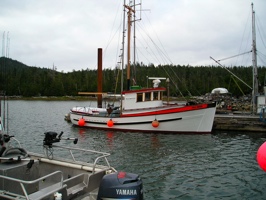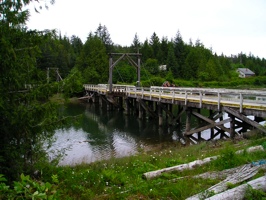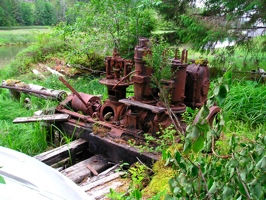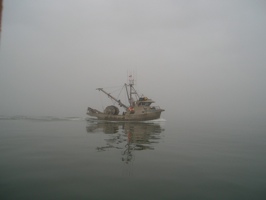 |
July 13 -- Oona River. We get a little "free ride" on the tide through Petrel Channel and arrive with plenty of daylight left for a shore expedition. The entrance to Oona River is shoal and a little tricky; boats of our size can only enter or leave on fairly high tides. Once we're in, we'll be staying a while :-) We are met on the dock by a few locals, including Lutz Budde the wharfinger. Everyone is friendly; in a community as small as Oona River (a dozen or so year-round residents), a visiting boat is an event. |
|
|
|
|
|
 |
Full Moon has been here many times in her fishing career; she's back in the waters she worked for 40 years. |
|
|
|
|
|
 |
Oona River was once a Norwegian fishing, logging and boat-building community. Now it seems to be fading slowly, quietly, into compost and rust. |
|
|
|
|
|
 |
The old boat sheds are ragged and starting to crumble. Dead boats, engines, and parts are strewn here and there along the river bank. |
|
|
|
|
|
 |
These two will never go fishing again. |
|
|
|
|
|
 |
Despite the melancholy End Times flavour of the village, Lutz is energetic and cheerful. He has painted his house in glowing colours, defying the climate -- a feat all the more remarkable as he's colourblind! He tells us that his wife numbered the paint cans and the rows of siding, and he painted strictly by numbers. Lutz' house and garden reflect his boundless energy and optimism; he's a delightful fellow. He hosts a morning kaffeeklatsch for the whole village plus any visitors, and we are heartily invited; but we equivocate a bit. If we stay for coffee tomorrow we'll miss our tide, and if we miss our tide we'll have to wait for late afternoon, which means either running to Rupert in the dark or not getting far. |
|
|
|
|
|
 |
The eponymous Oona River is wide and shallow, but the flow is fairly rapid. We are happy to take a walk a couple of miles up the river and back. Many of our anchorages offer no real walks ashore. Some, like Port Neville, are small outposts with no roads or paths beyond the dock and a few buildings. Others are wilderness -- some never inhabited. Some shores are so thickly forested that it's not practical to venture far from the beach. While kayak expedition are always fun, we both feel the need to stretch our legs and are pleased to take a "real hike" here. |
|
|
|
|
|
 |
On our stroll along the river I find the largest salmonberries I've ever seen; they're juicy and tasty, too. |
|
|
|
|
|
 |
The old bridge used to open to allow boats to pass down the river. We examine the defunct mechanism with interest. |
|
|
|
|
|
 |
Abandoned engines -- ship, truck, and donkey -- lurk here and there in the undergrowth. |
|
|
|
|
|
 |
On higher ground the Oona River is narrower and rocky... |
|
|
|
|
|
 |
... and Jon makes a better photograph of it than I :-)
On the whole we find Oona River attractive, but rather melancholy. It was on our list of places to consider as possible alternatives to Nanaimo -- as a home base and hailing port. But I confide to Jon that I don't think I could bear the endless overcast, the damp chill, and the sense of decay and decline. Half the houses are now owned by "summer people" -- vacation homes for nouveaux riches from the States or Alberta. On our walk we are passed by an SUV with California licence plates, which doesn't give us a good feeling. There are no working boatyards left -- no employment for a master boatwright. The fishery, like most BC fisheries, is in terminal decline. I don't fancy the climate for market gardening -- far too soggy and dark. I have lost any romantic notions I had about Porcher Island (from looking at charts); despite Lutz' charm and positive energy, this is not a place I'll be in a hurry to revisit. We'll leave early tomorrow, with the tide, for the run to Rupert. |
|
|
|
|
|
 |
July 14 -- we leave with the tide for Prince Rupert, heading north and inland. It's another gray, ghostly, damp day, glassy calm. |
|
|
|
|
|
 |
Occasionally we cross paths with a working boat. This one's a seine boat; Jon can identify them all at a glance. Each type of boat has its subculture: gillnetters, trollers, seiners, draggers, shrimpers, crabbers. We often end up talking about the tragedy of BC's fisheries; out here we are faced with the wreckage of the "gold rush" and the incontrovertible physical evidence of decline. Fleets that once were huge are reduced to a handful of boats; licenses that were once issued for $50 or $100 are now worth a million dollars and more. |
|
|
|
|
|
 |
Approaching Rupert (which is on Kaien Island, not on the mainland), the shore is shrouded in clouds and mist, and the ocean and the sky are barely distinct. We see a little more shipping as we close in on the port. |
|
|
|
|
|
 |
We plod past Ridley Island and the old bulk cargo port. Grain elevators stand ready to disgorge wheat by the kilotonne into Chinese bulk carriers. |
|
|
|
|
|
 |
Another bulk loading terminal fills more Chinese ships with coal mined in the hinterlands of northern BC -- in the Western Rockies, for the most part. More carbon, more pollution, more CO2. As usual I'm struck dumb with horror at the massive scale of the enterprise. |
|
|
|
|
|
 |
Next comes the new container port of Fairview http://www.nonstopdesign.com/bcinvestment/container-port.html -- mostly automated, providing few jobs (despite the usual glowing promises made by politicians and their contractor buddies during construction). Here comes the balance of trade: containers by the hundred, full of miscellaneous Cheap Plastic Crap -- mostly for the US market, some for Canada. Rupert's cargo handling facility now rivals Vancouver and is a shorter haul from the Chinese industrial ports than Long Beach or even San Francisco; the popularity of the port was supposed to "revitalise" Rupert (a dying fish packing town). Is any reader still naive enough to be surprised that, in fact, it hasn't? |
|
|
|
|
|
 |
Rupert's one of those places people say it's good to be from. This is the summer -- I'm rather glad I don't know what the winter is like. |
|
|
|
|
|
 |
With a happier climate it would be an attractive location for a town; the mountains are steep and green, the anchorage is large and the waterfront full of marinas and maritime resources |
|
|
|
|
|
 |
We pass fuel docks, packing plants, marinas and wharves on our way to Rushview Floats (a favourite dock for working boats). |
|
|
|
|
|
 |
Full Moon at Rushview, just about dead centre in the picture. Our arrival coincided with a gillnet closing (the end of a State-licensed fishing period), so the gillnetters were streaming in and rafting up three deep. As each boat arrived (gillnetters fish solo) the skipper would tie up, draw the curtains, and disappear into his bunk to sleep off two, three, maybe four days with little or no sleep. Here they will wait for the next opening, which will be announced by DFO on short notice; as soon as the word is out, the whole fleet will roar off to the next fishing locale and do it all again. (I cannot help musing on the role of cheap fossil fuel in creating this craziness, and wondering what will happen when it isn't cheap any more.) As crowding on the docks intensified, a gillnetter rafted up to us. As a fleet they have a reputation for slovenliness, rowdiness and bad manners -- so I was a little anxious -- but this skipper was polite and his boat clean and well kept. Moreover, there was a personal connection: his boat was built by our friend Barrie Farrell from Nanaimo -- it's a small maritime world. |
|
|
|
|
|
 |
Much to everyone's surprise, the sun (almost) came out after we tied up. A watery, pale, but palpably warmer light brightened up the waterfront and Rupert looked attractive for a few hours. We had plenty of daylight left (the summer days are long indeed) and I went off to scope out the grocery stores and explore the core of the town. It's a modest hike from the Floats to downtown; along the way one can pass through the "tourist district" (confusingly called Cow Bay but not to be confused with Cowichan Bay in the Southern Gulf!); here I saw a promising local art gallery and an indigenous cultural museum (the Museum of Northern BC) which I noted for future reference... |
|
|
|
|
|